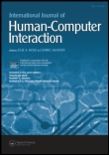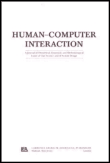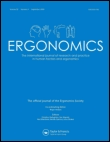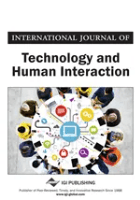
INTERNATIONAL JOURNAL OF HUMAN-COMPUTER INTERACTION
Scope & Guideline
Shaping Tomorrow's Interactions Today
Introduction
Aims and Scopes
- User Experience Design:
Research on optimizing user experience through design principles, usability testing, and interaction design methodologies. - Human Factors and Ergonomics:
Studies focusing on the ergonomic aspects of technology use, including user comfort, accessibility, and the physical and cognitive impacts of interface design. - Artificial Intelligence in HCI:
Exploration of the integration of AI technologies in human-computer interactions, examining user perceptions, trust, and the implications of AI on user experience. - Virtual and Augmented Reality:
Research on immersive technologies and their applications in education, training, and entertainment, assessing their effects on user engagement and learning outcomes. - Mobile and Wearable Technologies:
Investigations into mobile applications and wearable devices, focusing on their design, usability, and the influence of context on user interactions. - Social Media and Online Behavior:
Analysis of user behavior in social media environments, including the effects of social interactions and community dynamics on individual actions and attitudes. - Cognitive and Emotional Aspects of Interaction:
Studies examining the psychological factors influencing user interactions with technology, including emotional responses and cognitive load.
Trending and Emerging
- AI and Machine Learning in HCI:
A growing body of research explores the implications of AI and machine learning technologies on user interactions, decision-making processes, and ethical considerations. - Mental Health and Well-Being Technologies:
Increasing focus on the role of technology in supporting mental health and well-being, including apps and systems designed to assist users in managing stress and anxiety. - Social Robotics and Human-Robot Interaction:
Research on social robots and their interactions with humans is on the rise, addressing issues of trust, empathy, and the societal implications of robotic companionship. - Gamification and User Engagement:
A significant trend towards using gamification strategies to enhance user engagement and motivation in various applications, from education to health and wellness. - Design for Inclusivity and Accessibility:
Emerging focus on designing technology that accommodates diverse user needs, particularly for older adults and individuals with disabilities, emphasizing universal design principles. - Data Privacy and Security in HCI:
An increasing emphasis on privacy concerns and data security in user interactions, reflecting growing awareness of ethical considerations in technology usage.
Declining or Waning
- Traditional Usability Testing:
Research focusing solely on conventional usability testing methods is declining as more innovative, user-centered approaches gain traction. - Basic Interaction Models:
There is less emphasis on foundational interaction models without considering the complexities of user experience, emotional engagement, and contextual factors. - Physical Interaction Interfaces:
Research on purely physical interaction interfaces is becoming less prevalent, with a shift towards multimodal interactions that integrate digital and physical experiences. - General Technology Acceptance Models:
Studies using generic technology acceptance models without contextual adaptation are decreasing, as researchers seek more nuanced frameworks that incorporate specific user demographics and contexts.
Similar Journals

INTERNATIONAL JOURNAL OF INDUSTRIAL ERGONOMICS
Advancing human performance in industrial environments.INTERNATIONAL JOURNAL OF INDUSTRIAL ERGONOMICS, published by Elsevier, is a premier scholarly outlet dedicated to advancing the fields of human factors and ergonomics, as well as public health, environmental, and occupational health. With an impressive Q2 ranking in both relevant categories, this journal serves as a crucial forum for researchers and professionals seeking to share and access high-quality research aimed at optimizing human performance in industrial settings. The journal has been at the forefront of ergonomic research since its inception in 1986, fostering a rich discourse across disciplines and providing invaluable insights that bridge science and practice. While open access options are not available, the journal is widely accessible through institutional subscriptions. With a Scopus Ranking of #118/665 in Public Health and a #10/46 position in Human Factors, it caters to a diverse audience interested in the latest findings and applications in ergonomics, ensuring its relevance in a rapidly evolving field. Join a community dedicated to enhancing workplace safety and efficacy through rigorous research and innovative methodologies.

HUMAN-COMPUTER INTERACTION
Advancing Interactions Between Humans and TechnologyHUMAN-COMPUTER INTERACTION is a premier academic journal published by Taylor & Francis Inc, dedicated to the interdisciplinary field of HCI, which explores the dynamic interactions between humans and computers. With its ISSN 0737-0024 and E-ISSN 1532-7051, the journal maintains a strong presence within the academic community and is recognized for its significant impact, holding a commendable impact factor that underscores its relevance. Ranked in the Q1 category for both Applied Psychology and Human-Computer Interaction, it occupies a critical position in Scopus rankings, listed as #15 in Applied Psychology and #11 in Computer Science, Human-Computer Interaction, placing it in the top 6% of relevant fields. Covering a broad spectrum of topics from usability studies to user experience design, the journal aims to facilitate innovative research and provide insights that bridge theoretical frameworks and practical applications. Published since 1985 and continuously evolving, HUMAN-COMPUTER INTERACTION remains an essential resource for researchers, professionals, and students eager to contribute to and benefit from advances in understanding how technology can effectively serve human needs.

ERGONOMICS
Enhancing health and safety through research.ERGONOMICS is a premier journal that serves the dynamic fields of Human Factors and Ergonomics, as well as Physical Therapy, Sports Therapy, and Rehabilitation. Published by Taylor & Francis Ltd in the United Kingdom, this journal not only boasts a commendable impact factor but also holds a Q2 quartile ranking across its categories, underscoring its influence and academic rigor. With a convergence of significant research dating back to 1957, ERGONOMICS provides a multifaceted platform for the dissemination and discussion of innovative findings that enhance the interaction between people and their environments. Although the journal does not offer Open Access options, it remains a vital resource for researchers, professionals, and students seeking to deepen their understanding of ergonomic principles and applications. Positioned at the intersection of health and human behavior, ERGONOMICS is dedicated to advancing knowledge and promoting best practices in an era where the demand for safe and efficient work environments continues to grow.

Frontiers in Computer Science
Celebrating innovation and dialogue in the global computer science community.Frontiers in Computer Science is a premier open-access journal published by Frontiers Media SA that has rapidly established itself as a prominent platform for scholarly research in the diverse and evolving field of computer science. With a notable impact factor reflecting its high citation rates, this journal aims to disseminate innovative findings and groundbreaking studies across multiple subdisciplines, including Computer Science Applications, Computer Vision and Pattern Recognition, and Human-Computer Interaction. Since its inception in 2019, and with a consistent trajectory from 2019 to 2024, it has garnered accolades, achieving Q2 ranking in several categories and an impressive Q1 in miscellaneous areas of computer science. Researchers, professionals, and students alike are encouraged to contribute to this dynamic journal that serves as a vital resource for advancing knowledge and fostering collaborative dialogue in the global computer science community. Frontiers in Computer Science is committed to providing open access to research, promoting unrestricted sharing of ideas and fostering innovation at the intersection of technology and society.

Journal of Usability Studies
Enhancing interactions through rigorous research and analysis.The Journal of Usability Studies, published by the USERS EXPERIENCE PROFESSIONAL ASSOCIATION, is a pivotal platform for researchers and professionals dedicated to advancing the field of usability and user experience design. With an ISSN of 1931-3357, this journal offers a collection of peer-reviewed articles that explore innovative methodologies, emerging technologies, and applied research in usability studies. Though it operates under a traditional access model, the journal remains dedicated to fostering a detailed understanding of how users interact with systems and products. The Journal of Usability Studies is instrumental for those aiming to enhance user satisfaction through research-backed insights, making it a vital resource for academics, practitioners, and students seeking to contribute to the evolving discourse in human-computer interaction and usability engineering.

Journal on Multimodal User Interfaces
Innovating Interfaces for a Smarter TomorrowJournal on Multimodal User Interfaces, published by Springer, serves as a vital platform for scholarly exchange in the rapidly evolving fields of Human-Computer Interaction and Signal Processing. Established in 2008 and continuing through 2024, this journal maintains a high profile in academia, currently ranking in the Q2 category for both fields, indicating its significant contribution to ongoing research and practical applications. With its Scopus rankings placing it at #34 in Signal Processing and #49 in Human-Computer Interaction, it is recognized for publishing high-quality, impactful research. Although it is not an Open Access journal, the Journal on Multimodal User Interfaces remains accessible through institutional subscriptions. Researchers, professionals, and students will find the journal an essential resource for advancing knowledge and fostering collaboration in multimodal interaction technologies, which are crucial for enhancing user experience and developing intelligent systems.

THEORETICAL ISSUES IN ERGONOMICS SCIENCE
Innovating Insights into Ergonomic PracticesTHEORETICAL ISSUES IN ERGONOMICS SCIENCE, published by Taylor & Francis Ltd, is an essential academic journal that delves into the complexities of ergonomics and human factors, catering to researchers and professionals in the field. With an ISSN of 1463-922X and an E-ISSN of 1464-536X, this journal has established itself as a significant contributor to scholarly discourse since its inception in 2000. Operating out of the United Kingdom, it has earned a respectable Q3 ranking in Human Factors and Ergonomics as of 2023, reflecting its impactful research contributions within the social sciences. The journal aims to foster interdisciplinary dialogue and innovation, addressing key theoretical frameworks that influence ergonomic practices and research. While offering a traditional publication model, it is committed to maintaining high academic standards, as indicated by its position in the 64th percentile among its peers, ranking #17 out of 46 within its category in Scopus. THEORETICAL ISSUES IN ERGONOMICS SCIENCE is an indispensable resource for those seeking to enhance their understanding and application of theoretical concepts in ergonomics, and a platform for disseminating cutting-edge research findings.

International Journal of Technology and Human Interaction
Navigating the Future of Technology and Human ConnectionInternational Journal of Technology and Human Interaction, published by IGI Global, serves as a critical platform for the exploration of the intersection between technology and human behavior, offering an interdisciplinary lens on topics within the realms of Human-Computer Interaction and Information Systems. With an ISSN of 1548-3908 and an E-ISSN of 1548-3916, this journal has been contributing to scholarly discourse since its inception in 2005, with ongoing publication until 2024. Hosting a diverse range of research articles, case studies, and reviews, the journal aims to advance the understanding of how technology influences human experience and interaction patterns in various contexts. Although currently positioned in the Q4 quartile of both Human-Computer Interaction and Information Systems categories, the journal fosters knowledge that aspires to redefine scope and standards within the field. Its commitment to quality research is reflected in its Scopus rankings, showcasing its relevance despite its emerging status in academia. Targeting researchers, professionals, and students alike, the International Journal of Technology and Human Interaction invites contributions that address the pressing challenges and innovations at the nexus of technology and human interaction.

BEHAVIOUR & INFORMATION TECHNOLOGY
Unraveling the Dynamics of Human-Technology Relationships.BEHAVIOUR & INFORMATION TECHNOLOGY, published by Taylor & Francis Ltd, is a leading journal in the interdisciplinary field that bridges the gap between technology and human behavior. Established in 1982 and continuing through 2024, this journal has garnered a high reputation with impressive rankings in 2023 across various categories: Q1 in Arts and Humanities (miscellaneous), Q2 in Developmental and Educational Psychology, Q2 in Human-Computer Interaction, and Q1 in Social Sciences (miscellaneous). The journal's robust Scopus rankings point to its influence among peers, being placed in the top percentiles across multiple relevant disciplines. Although it does not offer open access, it remains a pivotal resource for researchers and practitioners interested in the dynamics of technology's impact on behavior. By publishing rigorously peer-reviewed research, BEHAVIOUR & INFORMATION TECHNOLOGY aims to foster insights that enhance our understanding of how information technology shapes human interactions and societal outcomes, making it a crucial publication for anyone engaged in this rapidly evolving field.

Computers in Human Behavior Reports
Bridging technology and psychology for innovative solutions.Computers in Human Behavior Reports, published by ELSEVIER, is a distinguished open-access journal dedicated to advancing interdisciplinary research at the intersection of technology and human behavior. Since its inception in 2020, the journal has quickly gained a prominent position in the academic field, attaining Q1 category rankings in multiple areas including Applied Psychology, Artificial Intelligence, Cognitive Neuroscience, Human-Computer Interaction, and Neuroscience (miscellaneous). Its robust standing is evidenced by its exceptional Scopus ranks, particularly in Neuroscience—where it is positioned 4th out of 49 journals—demonstrating a high level of influence and engagement within the community. The journal's aim is to disseminate cutting-edge research findings and foster dialogue among researchers, professionals, and students alike, thereby addressing crucial questions regarding the impact of technology on human behavior and vice versa. As an open-access publication based in the United Kingdom, it not only enhances the visibility of research but also ensures wider accessibility to groundbreaking insights that shape our understanding of human-machine interactions.